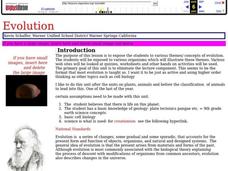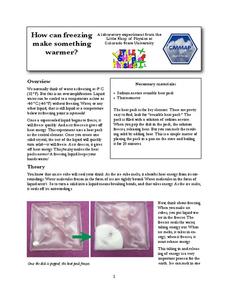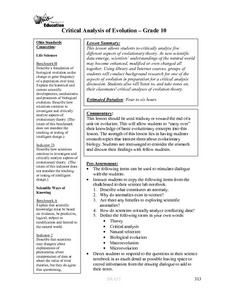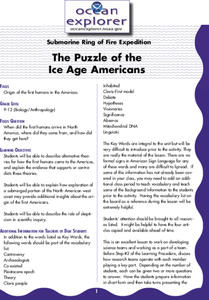University of Georgia
Bag O' Isotopes
Accommodate your chemistry class with an experiment that is both entertaining and educational. Through the activity, blossoming chemists perform calculations on various isotopes, as represented by beans and legumes, to obtain the average...
American Chemical Society
Joseph Priestley, Discoverer of Oxygen
Do you want to hear a joke about nitrogen and oxygen? NO. We all know there is oxygen in the air and that plants produce oxygen, but how was it discovered? Scholars read a handout, answer questions, and analyze material in the...
Consortium for Ocean Leadership
Nannofossils Reveal Seafloor Spreading Truth
Spread the word about seafloor spreading! Junior geologists prove Albert Wegener right in an activity that combines data analysis and deep ocean exploration. Learners analyze and graph fossil sample data taken from sites along the...
Curated OER
Evolution
Explore the concept of evolution and cell biology; your class can work in groups to use the internet to view websites on evolution, take a quiz, and complete a lab activity.
Curated OER
Radiation Comparison Before and After 9-11
Using the NASA website, class members try to determine if changes could be detected in cloud cover, temperature, and/or radiation measurements due to the lack of contrails that resulted from the halt in air traffic after the attacks of...
It's About Time
Communication Through Space
If humans do find aliens, how would we communicate with them? An intriguing lesson walks through some of the challenges associated with this question. How long would a message take to reach a specific destination, what language should we...
Chicago Botanic Garden
Recognizing Change (Observation vs. Inference)
What is the difference between making inferences and making observations? Young climatologists refer to a PowerPoint to make observations on each slide. They record their observations in a provided worksheet before drawing a...
Colorado State University
How Can Freezing Make Something Warmer?
Crazy fact—freezing liquid actually gives off heat! Young scholars investigate the transfer of energy when liquids freeze using a chemical heat pack. The heat pack gives off heat as its liquid core freezes.
Curated OER
Science and Politics in the Soviet Union
In this Soviet Union worksheet, students read a 2-page selection about scientific work in the country and then respond to 4 short answer questions based on the selection.
Curated OER
Science: Finlay and Yellow Fever
Ninth graders research the work of Carlos J. Finlay and his contributions to science. Once they have discussed his theories about diseases, they create tables comparing diseases that use insects as carriers. The lesson plan also...
Curated OER
Measuring Where We Sit In The Universe
Learners investigate scientific measurement. They use a variety of scales to do the job and communicate the results correctly. The teacher uses socratic questioning throughout the lesson plan checking for comprehension. Students measure...
Curated OER
Threats to Validity
Pupils review the components of the scientific habits of mind. In groups, they use this information and relate it to scientific investigations. They develop strategies to evaluate information and evidence and how to question sources of...
Curated OER
Solving Science Mysteries
Learners choose a science-related mystery to investigate such as the Loch Ness Monster or Bigfoot. They, in groups, research theories and give a persuasive talk presenting the theory they feel to be most likely.
Curated OER
Glacial Striation Investigation
Students operate a GPS unit to investigate the direction of glacier movement. They describe the motion of glacier movement by interpreting a graph. Students explain how scientists use glacier striations to determine glacier movement.
Curated OER
Classifying Items
In this classifying worksheet, students read about grouping similar objects into categories based on similarities. They determine how the groups are related and they draw a diagram showing categories and subcategories.
Curated OER
It's the Law
Students explain various scientific laws used in SCUBA diving. In this theory based lesson, students examine and explain how temperature, density, and salinity relate to SCUBA diving using various scientific laws to engage their learning.
Curated OER
Evidence of Evolution by Natural Selection - Testable Hypotheses
The factors that affect selection and evolution are investigated here. Information about some common ancestry examples are given but with no real scientific evidence. This presentation is very obvious in making biased claims about...
Curated OER
Scientific Inquiry: Periodic Motion
Students construct their own pendulum. In this physics lesson, students design an experiment to find the factors affecting its period. They formulate a conclusion based on experimental data.
Curated OER
"If the facts don't fit the theory, change the facts"
Students read a paper describing Einstein's 1905 papers. They answer five teacher-provided questions in small groups to consider the importance of his findings. Students describe in personal writings what effect they think these findings...
Curated OER
Critical Analysis of Evolution
Tenth graders discuss anomalies in nature and science. They discuss times that anomalies led to the collection of data that explained the phenomena and contributed to changing scientific understandings. Students work in groups to...
Curated OER
Physicists or Philosophers?
Trace the sequential process of the developing theories of atomic structure in the early 20th century, show, in historical development, how scientists "know" things, how experiments are set up and how interpretations are drawn from them,...
Curated OER
Athabaskan Migration & Bering Strait
Students study Athabaskan migration patterns and the Bering Strait Land Bridge theory. They investigate the importance of the expansion of trade and compare the differences between American Indian oral tradition accounts of origin and...
Curated OER
Chemical Controversy
Students explore the endocrine disruption theory. They work in groups to research and develop a persuasive oral argument to support one side of the endocrine disruption theory. Students engage in debate and other activities to analyze...
Curated OER
The Puzzle of the Ice Age Americans
Learners describe alternative theories for how the first humans came to the Americas, and explain evidence that supports or contradicts these theories. They examine the role of skepticism in scientific inquiries.

























